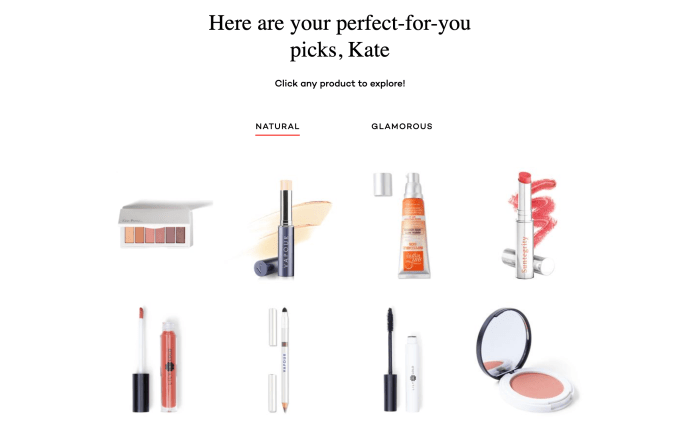Earlier this week, Thirteen Lune, a direct-to-consumer beauty platform that was launched last year in LA, announced $3 million in seed funding. We might not normally pause on this kind of development, especially in a market where dozens of startups are announcing funding every day, but this deal stood out for a few reasons.
First, its co-founder is Nyakio Grieco, a veteran of the cosmetics industry who earlier launched a skin-care brand that she sold to Sundial Brands, which is now part of Unilever. Her new e-commerce platform sells products from 100 different brands, 90% of which were founded by Black, Indigenous, and people of color. And the outfit leading the financing is Fearless Fund, a venture firm that was founded by women of color and is making its mark by focusing exclusively on backing women of color.
Also very interesting: a tie-up with JCPenney that immediately gives Thirteen Lune the kind of reach that most nascent startups can only dream about. JCPenney long partnered with Sephora, but Sephora’s contract with JCPenney is expiring in 2023, and it chose not to renew, leaving the retailer — which last year survived going bankrupt — with space to fill. Going into those spots right now are in-store “JCPenney Beauty” shops, and Thirteen Lune is a featured part of that offering, with 10 locations already up and running and plans for 600 more locations by the end of 2023.
Put together, the pieces add up to what Thirteen Lune is characterizing, persuasively, as among one of the first truly inclusive beauty platforms. Grieco told us a bit more this week, though she declined to answer questions about the financial mechanics of the JCPenney deal, citing a confidentiality agreement with the outfit.
Excerpts from this conversation have been edited for length.
TC: How did you get started in the beauty business?
NG: I’m a first-generation American of Kenyan descent, and almost 20 years ago, I left my job working in Hollywood to create a beauty brand based on my Kenyan family beauty secrets. My grandmother was a Kenyan coffee farmer, and my grandfather was a medicine man, and I felt that the continent of Africa at the time was very underrepresented in premium beauty. So I left my job to start making my grandmother’s coffee scrub and to learn to create products based in sustainable oils, the kind that my grandfather had the ability to go out in nature and extract to treat the skin.
I started as a very independent brand out of my apartment in my 20s and served every role: founder, shipping and receiving, customer service, accounting. I learned very quickly as a young Black woman and first-time entrepreneur how difficult it was to raise money, but I was able to get a little bit of friends-and-family capital together to take the products to market.
TC: You initially launched at Fred Segal; your skin creams were later carried in Ulta and are now available at Target. Why dive back into a new brand last year?
NG: While we were dealing with the global pandemic, as well as the most heightened moment of the Black Lives Matter movement of our lifetime, I found myself showing up on all of the lists of, you know, top Black-owned, Black-founded brands to shop and to follow. And while we saw a significant increase in sales at Target, it was really built on the precipice of such a heartbreaking time. And I just thought to myself, how strange is it that this moment is making people pay attention to my brand? I was in deep gratitude, but they were asking me questions like, ‘Can I use your products on my skin because I don’t look like you?’ [At the same time], I was seeing amazing initiatives like the 15% Pledge and Pull Up for Change come about, and in my head, when I was shopping those lists, I thought to myself, ‘I could fill a whole store with these incredible beautiful brands, many of which had such little distribution and visibility and most of which were direct to consumer . . . So my co-founder and I built Thirteen Lune based on a 90/10 rule, which is that 90% of all the products that we carry are created by BIPOC founders who create products for people of all colors — we are Black and brown for all. And then 10% of our brands are dedicated to fostering allyship, because it’s not our fight to fight alone. We have to join together. We’ve lived too many years in divisive times.
TC: You are dealing with a lot of products that a third-party logistics provider sends out to customers because you want to own that experience. How do you vet what you’re selling?
NG: A product has to have a strong founder story, because people buy into people before they buy into product. We also have what we call our beauty vanguard, which is influencers, makeup artists, celebrities and friends who help us, because we have such an enormous amount of products coming our way. And we have certain standards, including that we want all products to be clean, nontoxic, with good-for-you ingredients. [And we want them] to really serve a need, focusing on our melanin-rich, textured-hair customer first — those who have been the most underserved — but also to really represent the globe.
TC: What are some of the products that are geared more toward people with melanin-rich skin? Also, as a Greek-American with fair skin, what are some of the products that I perhaps haven’t been exposed to but might turn to Thirteen Lune to order?
NG: Melanin rich [could apply] all the way from somebody who’s just slightly darker than maybe you all the way to a tone much darker than myself, and we often have a sensitivity to certain acids and chemical exfoliators and things like that will burn our skin or just color our skin. We’re more prone to hyperpigmentation. We’re more prone to eczema and rosacea and those types of skin conditions. So the products that we bring to shelf are things like a chemical peel that’s made with maybe azelaic acid and not maybe other acids that would be too harsh for our skin.
It’s the same with textured hair. Shampoo is shampoo and conditioner is conditioner, but at the end of the day, especially as we are moving to a place where we are living with such multiracial and generational qualities and properties to our hair and our hair texture, [brands are on the rise like] Bomba Curls, which was created by an Afro-Latina founder named Lulu Cordero. She grew up with Dominican culture and back in those days, it was about having the straight — they call it “pelo malo” — hair to look more like white women from the Western world. And it caused a lot of damage to her, so much so that she suffered hair loss going into her college years.
She also happens to be brilliant and she was a chemistry major and she started playing with ingredients while she was in her college chemistry lab that would help to stimulate her hair growth; she started researching things that come from the earth and her culture like coffee and castor oil, and she developed her own hair oil [that was later lab-certified as counter safe]. That doesn’t mean that my friends that are blond-haired and blue-eyed can’t use Bomba Curls. The difference is that [the product] was created by a Black woman who understands our hair texture and understands the damage that we have done to our hair for so long, and she’s able to deliver on her promise [to repair that damage].
TC: You are also planning to roll out a private label brand. Why?
NG: When we look at Thirteen Lune and the data that we’re getting and will have access to [regarding] what this customer still needs and how we can better serve he, she, them, they through the lens of inclusivity, I’m excited about being able to create again. I love being a beauty retailer, but I’m a beauty founder first. That’s my passion, and I’ve missed being in a lab and being able to create. It’s literally my happy place.





